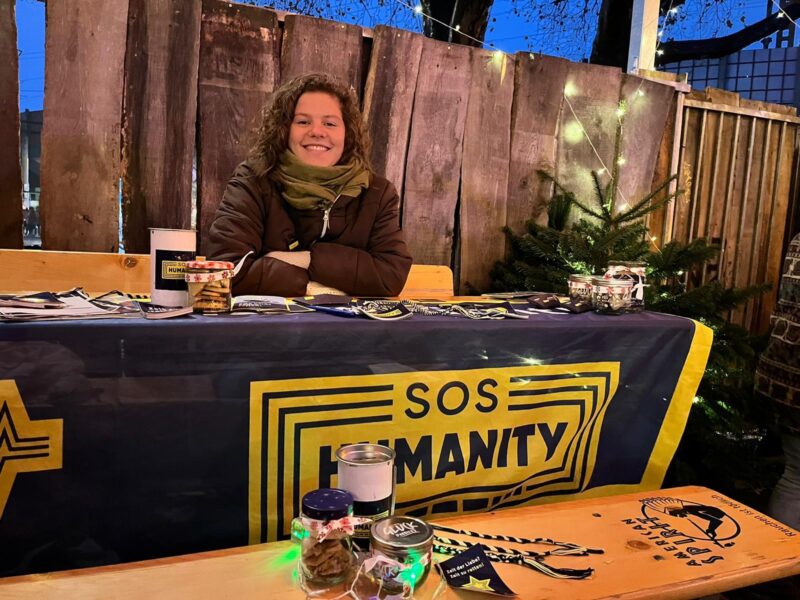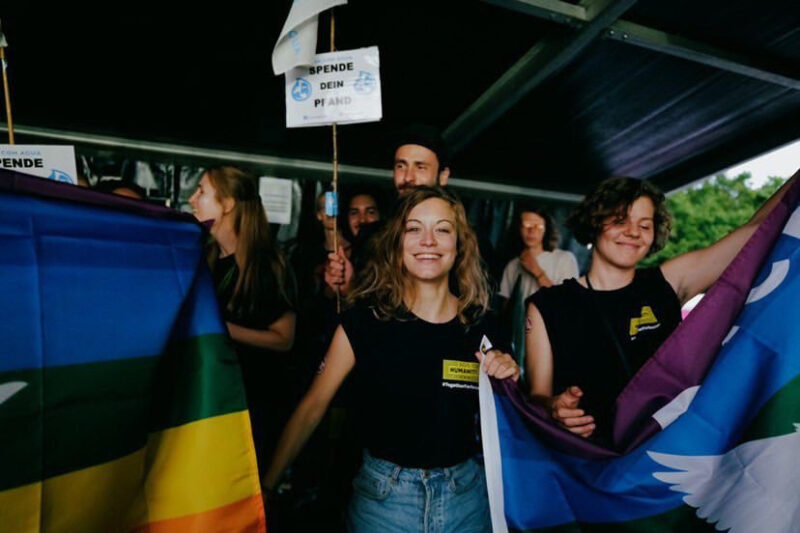“Come and join, even if you don’t have much capacity!” Camilla on the relevance of volunteer group activism

Camilla is a member of the Cologne volunteer group of SOS Humanity and has been active since the founding of the local group. She is now an integral part of the team that produces the SOS podcast ‘Save Our Souls’. In the interview, she talks about the many opportunities within volunteering and its benefits for NGOs.
How did you come to volunteer for SOS Humanity?
When I started my studies in Bonn, I was looking for a group that I could get involved with, but I was a little overwhelmed by what was on offer. When I heard from a friend who was already involved with SOS Méditerranée in Berlin that there was going to be a group in Cologne, it was an easy decision for me.
Where did your interest in civil search and rescue come from?
I heard a lot about the Berlin volunteer group through my friend and thought it was cool how people there mobilised. As the SOS Humanity office is also in Berlin, the volunteers there were always in close contact with each other and therefore able to talk to people who had been involved in rescue missions themselves or had done political advocacy work. I found that super interesting and fascinating right from the start, especially because the topic is not so widely discussed in the broader social and political discourse.
When I then delved deeper, I was shocked by the figures and especially by the testimonies that SOS Humanity uses a lot in its public relations work to tell individual stories. I was so moved by this that I have not been able to let the issue rest since then and I continue to try to make people aware of the situation in the central Mediterranean and educate them about it.
To what extent is volunteer work a relevant part of NGO work?
I see it as very important that our information stands at various events bring us into contact with people who would otherwise not be concerned with the issue. The fact that artists give us a stage and invite us to concerts, for example, especially in Cologne, means that the volunteers reach a completely different target group.
In addition, networking with other local groups involved in search and rescue can create local networks with broader spheres of influence. The podcast, which is organised by volunteers, also presents relevant topics for people who have not yet dealt much with the topic of refugees and maritime rescue.

What do you hope to achieve with the podcast project?
I believe that for many people, the podcast is a medium that they can easily integrate into their everyday lives and that provides low-threshold access to very difficult, complex topics. I hope that by making it available and easy to understand, more people will be willing to engage with the complex topic of search and rescue and overcome the general feeling of being overwhelmed. In the last episode on the CEAS (Common European Asylum Reform) reform with Wiebke Judith from Pro Asyl, for example, we made sure that we summarised the most important points in such a way that frequently asked questions were clarified to encourage recipients to get involved and take to the streets with us.
What are your personal demands to politicians?
I find it extremely frustrating how often expectations are not only not met, but even more catastrophic decisions are made in the end, such as Germany’s so-called “Repatriation Improvement Act”. SOS Humanity also did a lot of public relations work on this and became politically active, only to be presented with a fait accompli at the end, when everything had already been decided and mobilisation was no longer possible, where search and rescue is now even more criminalised.
That is shocking and I would like to see more honesty in dealing with the concerns and fears that search and rescue workers have. Because I had the feeling that many false reassurances were given. This is very disappointing, especially in light of the important and also very stressful work that maritime rescuers do, which is above all work that should actually be done by politicians.
Is there anything else that is particularly close to your heart?
As a volunteer, I would like to encourage people to go to newcomer or onboarding meetings in their city, get to know the volunteers in SOS Humanity’s local groups, engage in dialogue and see how they can get involved.
However, even people with limited capacities are absolutely welcome and there are many different ways to get involved. Even the smallest tasks, such as administrative work or helping to collect materials for the stand or for raffles, are super helpful for local groups, make them stronger and ensure that they can have a better impact and attract more attention.
In other words: come and join, even if you don’t have much capacity. It’s always great when people exchange ideas and show interest!


